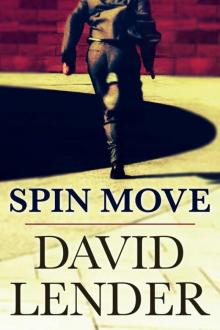- Home
- David Lender
Arab Summer Page 17
Arab Summer Read online
Page 17
He saw the track of another missile coming straight at them, braced himself, felt the heat and blast of the explosion and found himself on his back in the middle of the cabin. He looked to the rear of the cabin and saw it open to the desert where the tail of the Black Hawk had been. Black smoke and dust were everyplace. He looked to the side and saw Maloney get back to his feet and start firing his machine gun again. Stilton was on his side, not moving. Zac was down, coughing, then pulled himself to his knees and grabbed the M240H again and started firing, staggering around as he swiveled the machine gun, shooting at nothing, anything. Jaworski couldn’t see his M4A1 so he rolled onto his side and pulled out his Colt service revolver and aimed out the doorway of the chopper. Two men were running at them from an SUV, 25 yards away, and Jaworski raised the Colt and pulled off two rounds. He dropped one of them and Zac got the other.
Jaworski could hear his breath roaring in his ears, the rest of the sounds of the firefight muffled by the ringing in his ears from the missile blast. Zac stopped firing the machine gun and hunched over it to change the ammo belt, then got thrown backward from a spray of bullets. Jaworski winced as he rolled onto his stomach and pulled himself with his arms toward the doorway. He braced the Colt on the floor in both hands and kept firing, but there were too many targets. At least 25 of them were now running from their vehicles, weapons in hand, now that Zac’s M240H was silent. Is this it? he asked himself. Just as he emptied the Colt he took another hit in the arm, which threw him over sideways. On his back he saw Zac now up again with an M4A1 in his hand. He braced the rifle on the M240H and started firing bursts, raking across the desert and dropping the onrushing men.
Too many, Jaworski said to himself in desperation. He tried to roll on his side and couldn’t. His right arm was useless, even though he thought the body armor had held. He rolled his head to look out the window and then he heard the sound of a chopper, low, at an altitude of maybe only a few hundred feet, thundering from behind him, then the sound of its machine guns, big Gatlings, and saw the bullets peppering across the sand, tearing up the vehicles and men.
His breath rushed out in a gush of emotion. The Saudis! Another chopper flew over, strafing behind the first, then a third. He saw Zac drop his M4A1 and grab another ammo belt. He loaded it into the M240H and started firing again at the retreating men, at the SUVs that were still moving.
I knew I wasn’t gonna die out here in this desert today.
Tom had taken one of the automatic rifles from Ryan and instructed Sasha to stay forward with Ryan while he and Seth walked about 25 yards behind them. “If you hear the sound of engines or weapons being fired, run until you get over a dune where you can lay flat on the desert and try to stay out of sight,” Tom had said.
They’d only been walking for about 15 minutes when she heard the sound of automatic weapons behind her. She turned back to see Tom and Seth waving them forward, so she and Ryan started running as fast as they could, carrying their coolers and dealing with the uncertain footing in the sand. The gunfire was constant, punctuated with periodic explosions. She kept checking back, her heart racing, seeing Tom and Seth keeping the same distance from them. After another 15 minutes or so she heard helicopters. She looked back to see four of them with Saudi insignias doing strafing runs, the drum of the rotors and the staccato crack of their machine guns drowning out all the other sounds. After a few minutes the shooting stopped.
Sasha and Ryan turned around and walked back to Seth and Tom.
“Looks like Jaworski’s Saudi friends showed up,” Tom said.
A few minutes later, one of the Saudi helicopters picked them up and flew them to their base in Mecca. Sasha rode in silence, her hand inside her abaya gripping the Beretta.
CHAPTER 13
DAY ONE. GRAND MOSQUE, MECCA.
LATER THAT AFTERNOON, SAIF AND a team of 100 of his men entered the Grand Mosque and stood by the main gate, which, like all the gates, consisted of two-inch-thick vertical iron bars. Saif and his men were dressed like the pilgrims in ihram—white robes of unhemmed cloth—and sandals, their AK-47s, bags of hand grenades and other equipment concealed beneath their robes. More teams entered the other 18 gates. Saif and his team milled around inside the Mutaaf, the marble-floored courtyard in the unroofed section of the mosque, waiting. Rashid led a group of a dozen men surrounding Qahtani to keep him safe in the event of any shooting. Thousands of pilgrims performed the last of their ritual acts on the final day of the Hajj, the Tawaf, walking seven circuits counterclockwise around the sacred Kaaba, the square structure in the center of the courtyard that all Muslims turn toward in performing their daily prayers. The pilgrims’ footsteps and calls of “God, God is great” on their circuits rose in a deep rumble. More pilgrims circumnavigated the Kaaba on the first floor and roof of the mosque.
As Saif expected, there was minimal security inside the mosque, with only two slouching policemen near the main gate. At 3:00 p.m., Saif waved his arm to his men and pulled out his AK-47. He pointed it at one of the policemen, a disheveled man in his 50s with watery eyes, whose mouth dropped open as he saw the weapon and raised his hands. Saif heard a few cries from pilgrims, then shouts as a group of them ran out at the sight of the weapons. “Hand me your gun and leave and you won’t be harmed,” Saif said to the policeman. The man did as he was ordered. One of Saif’s men took the gun from the other policeman and they both hurried out through the gate. Saif’s men then pushed the gates closed and ran chains through the bars and secured them with locks, holding the gates shut.
He heard shots, then screams and a crowd of pilgrims pushed toward him, running from the commotion. Apparently it hadn’t gone so smoothly at one of the other gates, but by now all the gates would be secure, and Saif’s entire force of 1,000 armed men would be inside the mosque. Within minutes, Saif’s sniper teams would be in position at the top of each of the nine minarets.
Saif walked across the courtyard, half his men and the group still surrounding Qahtani following him, and the other half of his men taking positions near the main gate or climbing the steps to position themselves on top of the walls of the mosque overlooking Mecca. The throngs of pilgrims in the courtyard parted and cowered from him and his men. He entered the main prayer hall, then strode through it, more pilgrims screaming in fear and pushing to the outside of the hall. He left Rashid with the group of his men protecting Qahtani and then climbed the stairway to the security and communications room, now feeling his pulse elevated. He hoped the policemen in the room wouldn’t resist; deaths inside the mosque, particularly at this holy time of year, would jeopardize their cause.
He stood against the wall beside the door and called to the policemen inside. “Brothers, we mean you no harm. Open the door and hand out your weapons and there will be no violence. We have come to liberate and purify Saudi Arabia from the poisonous influence of the West, and return it to the original ways of Islam.”
He waited. No response.
“We will give you a few minutes to decide. After that, we will enter by force.”
Moments later he heard muffled voices inside the room, then louder, arguing. Finally, silence. Saif gave them another minute, then motioned to one of his men, who blasted the lock with a burst from his AK-47, swinging the door open into the room. Two more of his men tossed in concussion grenades. Saif was the first to charge into the room after the explosions, finding four policemen on the floor, two unconscious and two moaning. Saif’s men bound their wrists and dragged them all from the room.
Saif stepped back and watched, feeling a warm glow. One of his men took a seat in front of the microphone, pulled out a wad of papers and laid them on the console. Rashid entered with Qahtani and the rest of the men. He saw a few of them smile, nudge each other and raise their weapons in the air. Qahtani stepped forward to Saif, beaming, and embraced him.
“We begin here, today, my brothers,” Saif said, “in this holiest of places, in this holiest of times.”
Sasha had arrived at the Grand Mos
que at about 2:30 p.m., after Ryan had received Rashid’s text message: 3 P.M., GRAND MOSQUE. IT STARTS TODAY. GET SASHA INSIDE.
Ryan had immediately arranged transportation for the entire team—Zac had rejoined them—into Mecca from the Saudi military airport where the helicopters had dropped them, but because of crowds of pilgrims blocking the streets they had to walk the last quarter mile to the Grand Mosque. Sasha had insisted on being the only one to enter, saying she was the only one dressed appropriately—all the women on the Hajj wore abayas and headscarves—and that they would attract undue attention by not wearing ihram like all the male pilgrims. Tom had reluctantly agreed.
Sasha entered through one of the smaller western gates. She was well inside before she looked back. She felt a lump form in her throat as she saw Tom’s gaze still locked on her. She turned again and kept walking to a position in the middle of the courtyard. She watched from there for a half hour until a rebel group subdued the policemen guarding the gate and chained it shut. She worked her way across the Grand Mosque and was standing in the courtyard not far from the entrance to the main prayer hall when the rebels began broadcasting their message from the loudspeakers on the minarets. Whoever was speaking was experienced with it, because his cadence and intonation were the same as the broadcasts of prayers five times a day from mosques all over Saudi Arabia.
As the broadcast over the loudspeakers droned on, she watched as many of the pilgrims listened to the words as intently as they did to the daily prayer broadcasts. “...we advocate a return to the original ways of Islam. We repudiate the infidel influence of the greedy crocodiles of the West, and will expel all non-Muslims from Saudi Arabia. We declare the al-Asad dynasty to be illegitimate due to its pollution by the West, its consequent destruction of Saudi culture and its corrupt and ostentatious waste of the riches that rightfully belong to the Saudi Arabian people...”
Sasha had carried her cell phone and three handguns into the mosque inside her abaya—two Berettas and a Smith & Wesson—and stashed two of the guns with extra clips in cubicles built into the perimeter wall for prayer offerings, not far from where she now stood. She realized the odds of retrieving them were low, but higher than the odds of being able to keep the Beretta she had with her if she were captured or revealed herself.
She stepped into a group of pilgrims and behind one of the four-foot-thick columns around the perimeter walls, and phoned Tom.
“You okay?” he asked.
“I’m fine. They’ve chained the gates, taken over and are broadcasting their message from the minarets.”
“I can hear it. So can half of Mecca. I’m in a hotel suite on the 30th floor across from the mosque.”
“Do you have any idea where they might be broadcasting from?”
“Yassar’s trying to get me a floor plan of the mosque from the construction company that’s doing the expansion work on it. He said there’s a communications room not far from the imams’ offices, because they’re the ones who broadcast the prayers.”
“That means it won’t be far from the main prayer hall. I’ll check.”
“Don’t go exploring until you hear back from me. I’ll call you as soon as we get the plans.”
“I’m right in front of the main prayer hall. I’m sure I can find it.”
Tom raised his voice. “Don’t do anything crazy. If you blunder into something you’re likely to get yourself killed.”
“I knew the risks when I decided to do this,” she shot back, letting her voice show her annoyance.
“Knock it off!” he shouted through the phone. “I told you Yassar’s gonna get back to me.”
Sasha paused, then decided to end the conversation. “I’ll leave my cell phone on vibrate,” she said, and hung up.
She fingered the grip of the Beretta under her abaya. If she could get a clear shot at Saif, she could possibly take him out and avoid capture by blending into the crowds of pilgrims. Maybe, but she’d need to get lucky. She started toward the entrance to the main prayer hall.
Saif was in the security and communications room when he heard the crack of weapons fire. A moment later he got a call on his cell phone telling him about an assault. He grabbed his AK-47, told Rashid to stay with Qahtani, motioned to a group of men to follow him and ran up the stairs to the roof. He led his men through the crowd of terrified pilgrims to the outer wall, from which he could see the main gate.
Saif looked over to see a line of 25 or 30 policemen advancing behind riot shields, apparently trying to reach the main gate, cut the chains and force their way in. He could hear the sharp pops of the snipers’ rifles from the minarets, the staccato bursts from his men’s AK-47s on the walls above the gate. Fools. It was insanity, trudging forward in a straight line like British soldiers in the 1700s. Their riot shields were Plexiglas, fit only for stopping rocks, not bullets. Now at least a half dozen of the policemen were on the ground, bleeding.
Then he realized these poor men weren’t the fools; it was their commanders, ordering them to their deaths. These men were pawns. He remembered the hapless policeman he disarmed at the gate, his dispirited face, the face of a typical Saudi. These men are like us. Under the thumb of the royals, stripped of dignity.
After another minute a full dozen lay bleeding in the street, most not moving. Moments later, the remaining policemen began retreating. Mercifully, Saif’s men ceased firing as they turned and ran, dragging their wounded colleagues with them and leaving a half dozen bodies behind. It was all over in less than five minutes.
As Saif turned to go, he tasted bile in his mouth. The taste of disgust, of hatred of the royals.
“They were massacred,” Tom said to Yassar on the phone. “I can’t believe what I just saw. Who ordered this?”
“I have no idea. No one on the Council of Ministers would have approved this. You know our proscription on the use of deadly force without a fatwa.”
Some moron captain in the police trying to be a hero?
“What are you gonna do about a fatwa? These guys are dug in at the mosque, and the real party hasn’t even started yet. If you can’t mount a counterattack, we’re all gonna be in big trouble.”
Yassar didn’t respond right away. Tom gave him some time, imagining him inclining his head, fingering an eyebrow, contemplating. “It is a delicate situation,” Yassar finally said. “As you know, sharia, our Islamic law, forbids any violence between Muslim brothers. It also forbids any violence within the Grand Mosque. Even plants growing there cannot be uprooted without a religious sanction. Further, it is still during the time of the Hajj, during which additional restrictions apply. I will be one of those presenting to our Saudi Arabian Council of Senior Scholars, our ulema who interpret sharia. The only solution is for them to issue a fatwa allowing deadly force in retaking the mosque. Our advisors are counseling us on the line of argument that the rebels are blasphemers because they have violated the holiest site in Islam with violence and have desecrated the sanctity of the Hajj. Still, it may take some time.”
Tom felt uncomfortable, wondering if Yassar could get it done. He looked back at the TV, tuned to CNN on mute with the closed captions running, images of the Grand Mosque on the screen. “It’s all over CNN, the BBC, the US networks, everyplace. The rebels are getting just the kind of coverage they want.”
“Thankfully, world opinion is siding with our government. We have heard from most of the Arab nations, even from Israel, offering their support and confidence in our regime. Many are preparing to say so publicly. Your own President Santorum has called King Abdul to express his support of our government.”
Tom was sure that was just tongue-wagging. He checked his watch. Langley had set up a secure line for Tom to talk to Ross in about a half hour. He’d learn more then. An image of Ayatollah Khamenei of Iran flashed up on the TV screen, his words on the closed captions saying, “This is the work of criminal American imperialism.”
We’re still the Muslim world’s pincushion.
Tom said, “We’ve been
monitoring the stuff they’re spouting over the loudspeakers from the minarets, and still no mention of the Mahdi.”
“I know.”
“Wait until they drop that one. By our estimates, that’s in seven days. And we think that’s when they launch their full offensive. If our sources are right, they’ll come at you from all sides, in every province.”
“Assad, the head of our Secret Police, is on the way to Mecca now to take command. I will also fly in immediately after my meeting with the Senior Scholars.” Yassar paused. “And Sasha, have you heard from her?”
“Yeah. She called a little while ago. She’s fine, armed and waiting. Any word on when we can get those plans for the mosque?”
“You should have them in an hour. They’ll show everything, including the communications room. What is her plan?”
“You’re asking the wrong guy.”
Yassar didn’t respond.
Tom wondered if he’d offended him with his abruptness. But it was no time for delicacy. This fatwa business had him uneasy. I hope Sasha gets to Saif soon. This thing might hit the fan sooner than we thought.
The firing at the gate had stopped when Sasha entered the main prayer hall and blended into the crowds of pilgrims milling around. She averted her eyes and tensed as she walked past the second of the rebel sentries holding an AK-47, this one about three-quarters of the way back into the main prayer hall. After she passed him she resumed scanning the hall without moving her head, all her senses alert. She stopped, then stepped behind one of the four-foot-thick columns, breathing deeply to calm herself. After a moment she started walking again, and as she approached the platform from which the imams would give their lessons and read from the Koran at the rear of the hall, she saw two more rebels with rifles guarding doorways to stairways on either side of the platform. The marble stairs converged on a landing visible 20 feet above and behind the platform.

 Arab Summer
Arab Summer Sasha Returns
Sasha Returns Spin Move
Spin Move Bull Street (A White Collar Crime Thriller)
Bull Street (A White Collar Crime Thriller) Vaccine Nation
Vaccine Nation Trojan Horse
Trojan Horse